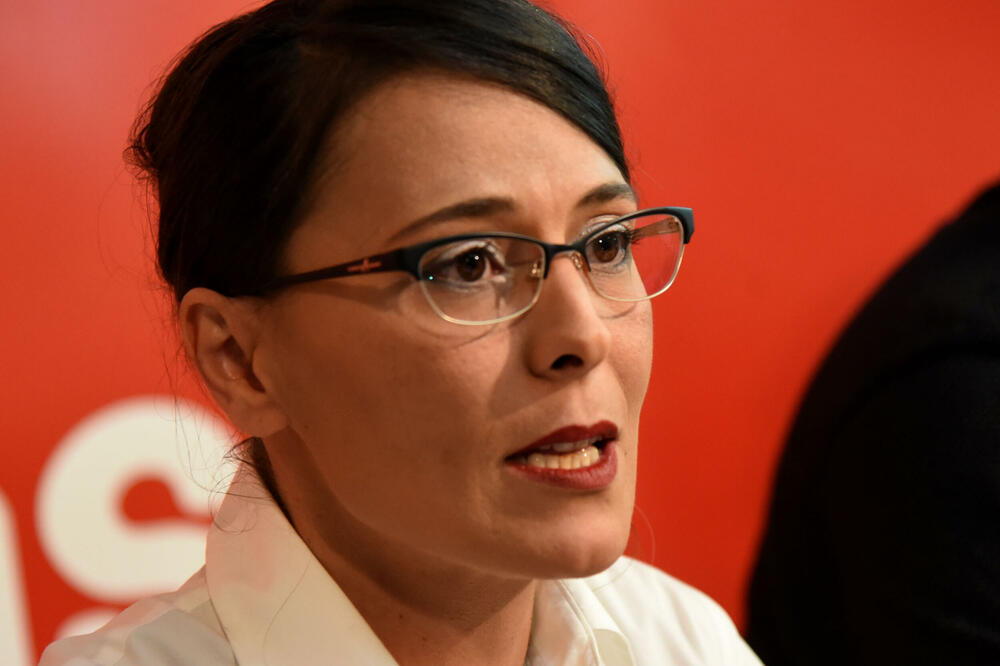Author: Tina Popović (Independent Daily Vijesti)
Not a single “black box” of the former regime has been opened, neither thanks to the Law on Free Access to Information, nor thanks to the political will of the Government, the Executive Director of the Network for Affirmation of NGO Sector (MANS), Vanja Ćalović-Marković, told “Vijesti”.
Ćalović-Marković, Photo: Luka Zeković
International Day of Free Access to Information was marked yesterday.
Ćalović-Marković says that the adoption of the Law on Free Access to Information “is a true test of the existence of political will for someone to fight against corruption in their own ranks, and allow citizens to know how the state money is used or how public officials do their work.”
“Neither during the government of Zdravko Krivokapić nor during the government of Dritan Abazović did we get the Law on Free Access to Information. Even today, the state administration acts according to the regulation that was amended in 2017 by the votes of the MPs of the Democratic Party of Socialists. That law was destroyed that year to such an extent that the European Commission pointed out in its report that it must be improved and harmonized with international standards. The Constitutional Court has ceased to function, and from 2017 to today, for over five years, it has not seen fit to decide upon an initiative related to the current Law on Free Access to Information”, she stated.
Ćalović-Marković points out that at the moment “we do not have a legal solution that, first of all, is in accordance with our Constitution”.
“This is regarding the fact that in 2017, the text of the Law included additional limitations and restrictions on access to data, which do not exist neither in the Constitution nor in international conventions”, Ćalović-Marković emphasized.
She points out that only the practice of institutions is worse than that regulation.
“That practice did not improve with the change of government, because we all expected that some archives would be opened and the secrecy marks removed. Instead, there is a continuity of the previous government, and especially of the current government, in terms of declaring data secret or not responding to requests for information. Let me remind you that since the change of the regime, there has not been a single serious set of information published by the government. For example, we know that for decades, thousands of citizens have been looking for information on privatizations, because companies were destroyed and cleaned out through these procedures, and the new owners got rid of the owners and minority shareholders. To date, this government has not published any information from the Privatization Council”, Ćalović Marković says.
According to her, the proposal for amendments to the Law on Free Access to Information, submitted by civil sector organizations, “was finally submitted as a proposal to the Parliament by Krivokapić’s Government, after numerous meetings.”
“However, this government, together with all the other proposed laws, withdrew it when it was elected and has not returned it to the Parliament to this day. Unfortunately, this speaks of the lack of political will to reveal the current affairs of this Government, as well as the previous affairs, which are still marked with secrecy”, Ćalović-Marković says.
She clarifies that the civil sector has no one to refer to when it comes to sending urgent request regarding the amendments to the Law on Free Access to Information.
“It is because we know that the Government in a technical mandate should not be allowed to propose laws. If they wanted to do so, the law was finished a long time ago, harmonized with European standards, and as far as the civil sector is concerned, one article was disputable, and that could have been resolved through amendments in the Parliament. The draft was withdrawn for no reason, and no one contacted us to tell us what was being done about it, although we know that some other regulations made by the Krivokapić’s administration were submitted to the parliament by Abazović’s. Why is this law locked in someone’s drawer, that is the question”, Ćalović-Marković concluded.




